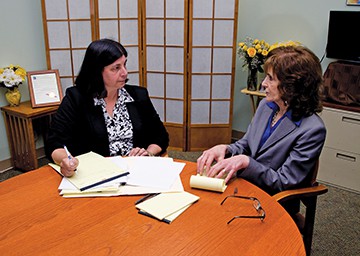TRANSITION FROM PARENTS TOGETHER
TO PARENTS APART CAN BE TOUGH.
STORY BY Elizabeth Heubeck PHOTOGRAPH BY Meredith Tankersley
Sue Jones (not her real name) was a new mother when she separated from her son’s father. Though she doesn’t mention the circumstances surrounding the divorce, it’s clear that it was a painful time in her life. “For a long time, I didn’t speak to my son’s father when I would drop him off,” says Jones, a Howard County teacher and the divorced mother of a 9-year-old son.
Despite the hurt, Jones knew that, for the sake of her son, she had to get beyond the bitterness she felt toward her ex-husband.  “I realized I wanted to be able to interact with my son’s father in a positive way. But I didn’t know what to do to make that happen,” she says.
“I realized I wanted to be able to interact with my son’s father in a positive way. But I didn’t know what to do to make that happen,” she says.
While single parenthood is a terrifying proposition for many, how you manage immediately following the breakup of the marriage can make the journey much smoother, say experts. It’s about deciding, from the beginning, to focus on the children involved — not on how betrayed, angry or overwhelmed you feel. This is the message that Howard County’s National Family Resiliency Center, Inc. (NFRC) drives home to their clients who are undergoing such transitions within their families. They call the approach, aptly, child-centered.
“The child-centered approach says ‘We’re going to help the two of you define how you can work together’,” explains Risa J. Garon, executive director of NFRC, which aims to help clients, both adults and children to “preserve a sense of family, foster healthy relationships and adjust constructively to change.”
Easier said than done, of course. But, since its founding in 1983, the NFRC has effectively helped more than 28,000 clients accept their family transitions with a greater sense of strength and support than they would have otherwise. The center offers individual and group counseling services aimed at both parents and children. It also maintains strong connections with its clients, many of whom become volunteer peer counselors once they’ve successfully completed counseling themselves.
Such was the case with Jones, who became a peer counselor at NFRC after receiving group counseling with other women undergoing similar transitions. Counseling made her realize that the fears and feelings she was experiencing were not unique to her situation. She also learned a critical take-home message.
She was taught to communicate with, and talk about, her ex-husband in a way she originally didn’t believe possible. Essentially, Jones trained herself to separate her feelings about her ex when she is around her son. “The child loves both parents. If you’re speaking badly about someone [his father] he loves, he’ll internalize it. It puts the child in a really awkward position,” Jones says.
Consensus-building between couples who have chosen to live apart may not be easy, but most parents are willing to do it for their children. “It’s like this: ‘I may not like you, but we have to come together and agree on this because we are both parents’,” says Jones, who now shares this critical message with others going through a transition similar to her own. Although Jones is providing her time and energy free of charge, she feels like she’s gaining as much as she’s giving. “Every time we get to tell our stories it’s a little therapeutic,” she says.
That need for support also rings true for men experiencing a family transition. In fact, as former NFRC client Robert Abercrombie points out, emotional support is more often lacking for men than for women during divorce. “We tend to go through it alone. There’s a lot of stuff you have to now know. There’s a lot more nurturing you have to do. I had to figure out how to do my daughter’s hair,” he says.
Abercrombie says he never resisted seeking counseling support. As a child of divorce himself, he wanted to make it easier for his children than it was for him. He recalls confusion when, as a child, his parents offered differing accounts from their own, clearly biased, perspectives. “When my kids would ask me questions, I would try to answer as simply as possible and leave the commentary out,” he says. “There were plenty of times when I wanted to say ‘This wasn’t my fault’, but I bit my tongue.”
While Abercrombie and Jones were resourceful enough to seek counseling during their divorce, not everyone thinks to do so. And yet, as NFRC’s Garon points out, the need is great. “Divorce is the number two stressor second only to death,” she says. “We’re supported in death. Divorce is a very isolating experience.”
But that isolation can be lessened. “Family therapy cultivates the idea of hope and wellness. There will be life after divorce, the children will be okay, if you have early intervention,” says Lanada Williams, a licensed professional counselor based in Washington, D.C., and member of the American Counseling Association.
Sometimes, newly separated parents aren’t ready to face their isolation — or even to reach basic agreements with one another regarding child custody. That’s why, in Maryland, parents who cannot successfully reach an agreement regarding child custody are mandated to attend a monthly parenting seminar hosted by NFRC. It’s an interactive affair in which family attorneys and judges, as well as parents and children who have been on the counseling side at NFRC, share information on the divorce process and how best to move forward — with children at the forefront.
Elizabeth J. Case, a Columbia-based attorney trained in mediation and collaborative law who speaks at the NFRC parenting seminars and whose daughter serves as a peer counselor for the organization, believes in the value of the NFRC, which she credits with broadening the scope of professionals involved in divorce. “It has re-focused the judiciary and family law attorneys to understand that this is not just a legal issue like a contract case. There’s a lot more to it. You really have to consider the children,” Case says.
Williams matter of factly draws a parallel between the need for legal support and mental health support during a transition like divorce. It’s expected, even required, to hire a professional who will manage the legal and financial aspects of a divorce. Given the equal or greater amount of emotional baggage that needs to be sorted through, it makes perfect sense to seek the support of a mental health professional during a divorce.
“Family therapy honors the process of separation. It tells us that this web of relationships is still valuable, even though we’re going to be in different homes,” Williams says. And, in the best case scenario, it can help separated parents learn to respect each other’s philosophies regarding child rearing and, hopefully, allow them to collaborate on the big child-rearing decisions.
And if the big decisions are tackled, it might make the small ones – like how much media time to allow, the type of snacks permitted or when your child is old enough to go to boy-girl parties – easier to navigate. *




